唐诗英译1
- 格式:doc
- 大小:47.00 KB
- 文档页数:9
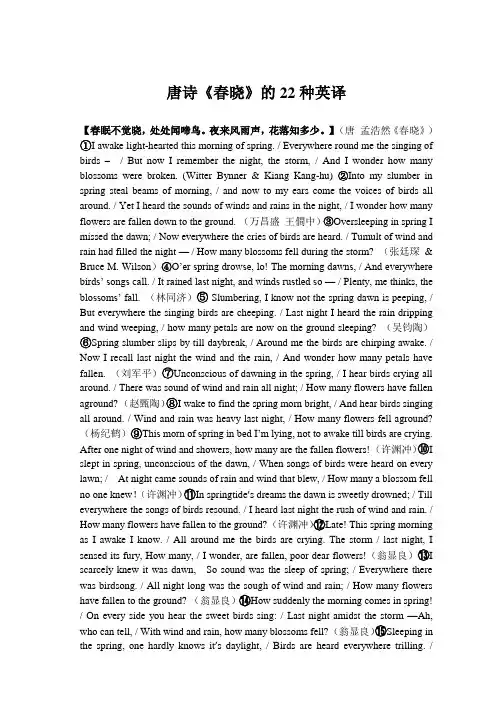
唐诗《春晓》的22种英译【春眠不觉晓,处处闻啼鸟。
夜来风雨声,花落知多少。
】(唐孟浩然《春晓》)①I awake light-hearted this morning of spring. / Everywhere round me the singing of birds –/ But now I remember the night, the storm, / And I wonder how many blossoms were broken. (Witter Bynner & Kiang Kang-hu) ②Into my slumber in spring steal beams of morning, / and now to my ears come the voices of birds all around. / Yet I heard the sounds of winds and rains in the night, / I wonder how many flowers are fallen down to the ground. (万昌盛王僴中)③Oversleeping in spring I missed the dawn; / Now everywhere the cries of birds are heard. / Tumult of wind and rain had filled the night — / How many blossoms fell during the storm? (张廷琛& Bruce M. Wilson)④O’er spring drowse, lo! The morning dawns, / And everywhere b irds’ songs call. / It rained last night, and winds rustled so — / Plenty, me thinks, the blossoms’ fall. (林同济)⑤ Slumbering, I know not the spring dawn is peeping, / But everywhere the singing birds are cheeping. / Last night I heard the rain dripping and wind weeping, / how many petals are now on the ground sleeping? (吴钧陶)⑥Spring slumber slips by till daybreak, / Around me the birds are chirping awake. / Now I recall last night the wind and the rain, / And wonder how many petals have fallen. (刘军平)⑦Unconscious of dawning in the spring, / I hear birds crying all around. / There was sound of wind and rain all night; / How many flowers have fallen aground? (赵甄陶)⑧I wake to find the spring morn bright, / And hear birds singing all around. / Wind and rain was heavy last night, / How many flowers fell aground? (杨纪鹤)⑨This morn of spring in bed I’m lying, not to awake till birds are crying. After one night of wind and showers, how many are the fallen flowers! (许渊冲)⑩I slept in spring, unconscious of the dawn, / When songs of birds were heard on every lawn; / At night came sounds of rain and wind that blew, / How many a blossom fell no one knew!(许渊冲)⑪In springtide’s dreams the dawn is sweetly drowned; / Till everywhere the songs of birds resound. / I heard last night the rush of wind and rain. / How many flowers have fallen to the ground? (许渊冲)⑫Late! This spring morning as I awake I know. / All around me the birds are crying. The storm / last night, I sensed its fury, How many, / I wonder, are fallen, poor dear flowers!(翁显良)⑬I scarcely knew it was dawn, So sound was the sleep of spring; / Everywhere there was birdsong. / All night long was the sough of wind and rain; / How many flowers have fallen to the ground? (翁显良)⑭How suddenly the morning comes in spring! / On every side you hear the sweet birds sing: / Last night amidst the storm —Ah, who can tell, / With wind and rain, how many blossoms fell? (翁显良)⑮Sleeping in the spring, one hardly knows it’s daylight, / Birds are heard everywhere trilling. /There’ve been sounds of wind and rain in the night, / How many blossoms have been falling? (翁显良)⑯I slept in spring not conscious of the dawn, / But heard the gay birds chattering all round, / I remember, there was a storm at night. / Pray, how many blossoms have fallen down? (翁显良)⑰Sleeping in spring oblivious of dawn / everywhere I hear birds / after the wind and rain last night / I wonder how many petals fell (Red Pine) ⑱Asleep in the spring, dawn comes to me unawares; / I hear the birds singing all round. / When night comes there’s the sound of wind and rain; / Who knows how many blossoms fall to the ground. (Peter Harris)⑲I scarcely knew it was dawn, / So round was the sleep of spring; / Everywhere there was birdsong. / All night long was the sough of wind and rain; / How many flowers have fallen to the ground? (刘师舜1967)⑳How suddenly the morning comes in Spring! / On every side you hear the sweet birds sing. / Last night amidst the storm – Ah, who can tell, / With wind and rain, how many blossoms fell? (DAWN IN SPRING John Turner) 21.In drowsy spring I slept till daybreak / When the birds cry here and there, I awake. / Last night I heard a storm of wind and rain, / How many blossoms have fallen again? (《中国翻译》杂志2001年第2期)22. This spring morning in bed I’m lying / Not awake till I hear birds crying. / After one night of wind and showers / How many are the fallen flowers? (《中国翻译》杂志2001年第2期)注:这是本人正在编著的《汉英翻译大辞典》中的一个词条。
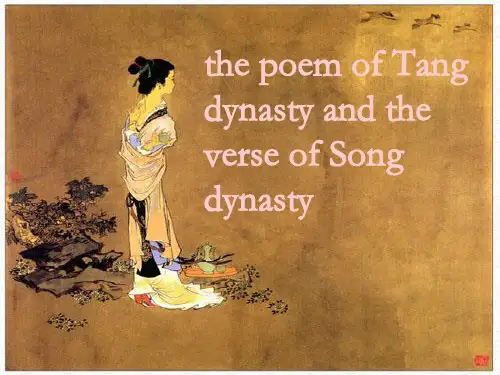
the poem of Tang dynasty and the verse of Song dynastyTangpoems :A spring morningThis spring morning in bed I’m lying , Not to awake till birds are crying . After one night of wind and showers , How many are the fallen flowers .Shower:阵雨春晓春眠不觉晓,处处闻啼鸟。
夜来风雨声,花落知多少。
静夜思李白床前明月光,疑是地上霜. 举头望明月,低头思故乡. In the Still of the NightI descry(望见,看到)bright moonlight in front of my bed.I suspect it to be hoary(白的,灰白的)frost on the floor.I watch the bright moon, as I tilt(使倾斜)back my head.I yearn(怀念), while stooping(俯身), for my homeland more.(徐忠杰)A Tranquil(安静的,安宁的)Night Abed(在床上的), I see a silver light, I wonder if it's frost aground.Looking up, I find the moon bright; Bowing, in homesickness I'm drowned. (许渊冲译)1,In the Quiet NightSo bright a gleam(微光,光束)on the foot of my bed---Could there have been a frost already?Lifting my head to look, I found that it was moonlight. Sinking back again, I thought suddenly of home.(Tr. Witter Bynner)2,Night ThoughtsI wake, and moonbeams play around my bed,Glittering(闪光)like hoar-frost to my wandering eyes; Up towards the glorious moon I raise my head,Then lay me down---and thoughts of home arise.( Tr. Herbert A. Giles)3,On a Quiet NightI saw the moonlight before my couch(沙发,床),And wondered if it were not the frost on the ground.I raised my head and looked out on the mountain noon, I bowed my head and though of my far-off home.One-HeartedWhen those red berries (浆果,干果)come in springtime,Flushing (迅速增长,绽出新芽)on your southland branches,Take home an armful, for my sake,As a symbol of our love.相思红豆生南国春来发几枝愿君多采撷此物最相思A Song at Wei-chenA morning-rain has settled the dust in Wei-chen; Willows are green again in the tavern(小旅馆,旅舍)dooryard ...Wait till we empty one more cup --West of Yang Gate there'll be no old friends.渭城曲渭城朝雨邑轻尘客舍青青柳色新劝君更尽一杯酒西出阳关无故人A Night-mooring(停泊)Near Maple(枫)BridgeWhile I watch the moon go down, a crow(乌鸦)caws(乌鸦叫)through the frost;Under the shadows of maple-trees a fisherman moves with his torch;And I hear, from beyond Su-Chou, from the temple on Cold Mountain, Ringing for me, here in my boat, the midnight bell.枫桥夜泊月落乌啼霜满天江枫渔火对愁眠姑苏城外寒山寺夜半钟声到客船清明(唐)杜牧清明时节雨纷纷,路上行人欲断魂。
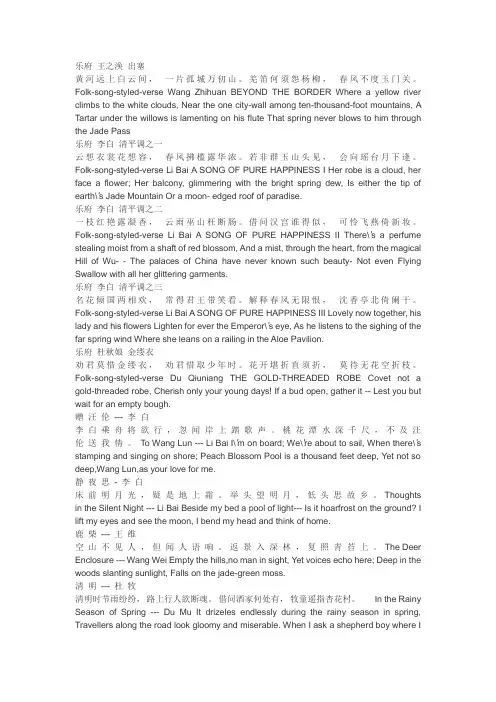
乐府王之涣出塞黄河远上白云间,一片孤城万仞山。
羌笛何须怨杨柳,春风不度玉门关。
Folk-song-styled-verse Wang Zhihuan BEYOND THE BORDER Where a yellow river climbs to the white clouds, Near the one city-wall among ten-thousand-foot mountains, A Tartar under the willows is lamenting on his flute That spring never blows to him through the Jade Pass乐府李白清平调之一云想衣裳花想容,春风拂槛露华浓。
若非群玉山头见,会向瑶台月下逢。
Folk-song-styled-verse Li Bai A SONG OF PURE HAPPINESS I Her robe is a cloud, her face a flower; Her balcony, glimmering with the bright spring dew, Is either the tip of earth\'s Jade Mountain Or a moon- edged roof of paradise.乐府李白清平调之二一枝红艳露凝香,云雨巫山枉断肠。
借问汉宫谁得似,可怜飞燕倚新妆。
Folk-song-styled-verse Li Bai A SONG OF PURE HAPPINESS II There\'s a perfume stealing moist from a shaft of red blossom, And a mist, through the heart, from the magical Hill of Wu- - The palaces of China have never known such beauty- Not even Flying Swallow with all her glittering garments.乐府李白清平调之三名花倾国两相欢,常得君王带笑看。
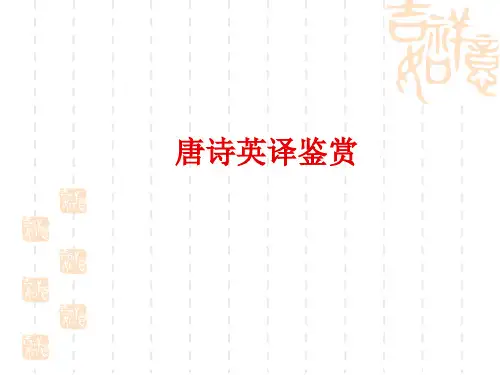
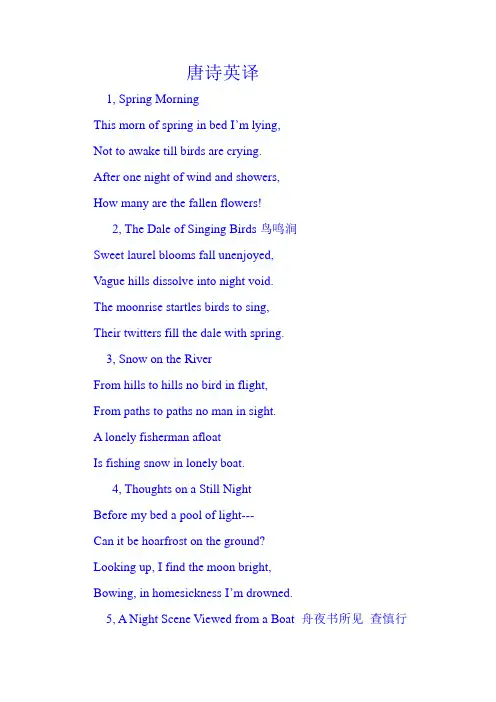
唐诗英译1, Spring MorningThis morn of spring in bed I’m lying,Not to awake till birds are crying.After one night of wind and showers,How many are the fallen flowers!2, The Dale of Singing Birds鸟鸣涧Sweet laurel blooms fall unenjoyed,Vague hills dissolve into night void.The moonrise startles birds to sing,Their twitters fill the dale with spring.3, Snow on the RiverFrom hills to hills no bird in flight,From paths to paths no man in sight.A lonely fisherman afloatIs fishing snow in lonely boat.4, Thoughts on a Still NightBefore my bed a pool of light---Can it be hoarfrost on the ground?Looking up, I find the moon bright,Bowing, in homesickness I’m drowned.5, A Night Scene Viewed from a Boat 舟夜书所见查慎行In moonless night a fishing lantern sheds,Like a lonely firefly a feeble gleam.The night wind raises wave on wave and spreads 微微风簇浪,a skyful of stars all over the stream.6, Home-ComingYoung, I left home and not till old do I come back,My accent is unchanged, my hair no longer black.The children whom I meet on the way don’t know me, “Where are you from, dear sir?” they smile and ask with glee.7, The Mourning DayA drizzling rain falls like tears on the Mourning Day,The mourner’s heart is going to break on his way.Where can a wine-shop be found to drown his sad hours?A cowherd points to a cot’mid apricot flowers.8, On the Stork TowerThe sun beyond the mountain glows,The Yellow River seawards flows.You can enjoy a grander sight,By climbing to a greater height.。
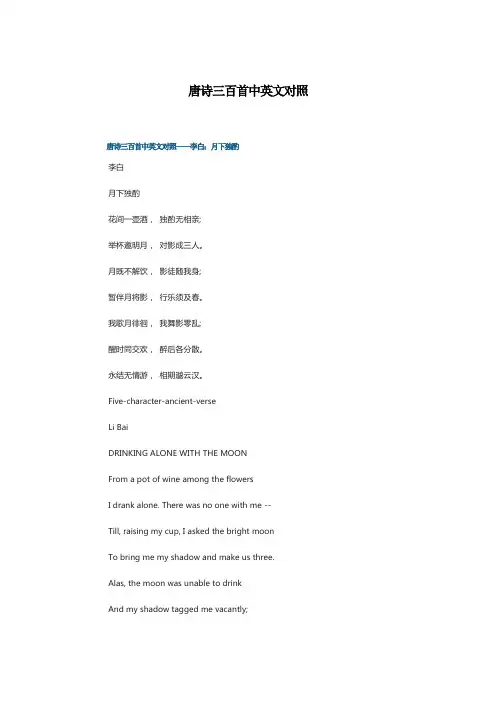
唐诗三百首中英文对照唐诗三百首中英文对照——李白:月下独酌李白月下独酌花间一壶酒,独酌无相亲;举杯邀明月,对影成三人。
月既不解饮,影徒随我身;暂伴月将影,行乐须及春。
我歌月徘徊,我舞影零乱;醒时同交欢,醉后各分散。
永结无情游,相期邈云汉。
Five-character-ancient-verseLi BaiDRINKING ALONE WITH THE MOONFrom a pot of wine among the flowersI drank alone. There was no one with me --Till, raising my cup, I asked the bright moonTo bring me my shadow and make us three.Alas, the moon was unable to drinkAnd my shadow tagged me vacantly;But still for a while I had these friendsTo cheer me through the end of spring....I sang. The moon encouraged me.I danced. My shadow tumbled after.As long as I knew, we were boon companions.And then I was drunk, and we lost one another. ...Shall goodwill ever be secure?I watch the long road of the River of Stars.唐诗三百首中英文对照——李白:春思李白春思燕草如碧丝,秦桑低绿枝;当君怀归日,是妾断肠时。
春风不相识,何事入罗帏?Five-character-ancient-verseLi BaiIN SPRINGYour grasses up north are as blue as jade,Our mulberries here curve green-threaded branches; And at last you think of returning home,Now when my heart is almost broken....O breeze of the spring, since I dare not know you,Why part the silk curtains by my bed?唐诗三百首中英文对照——杜甫:望岳杜甫望岳岱宗夫如何? 齐鲁青未了。
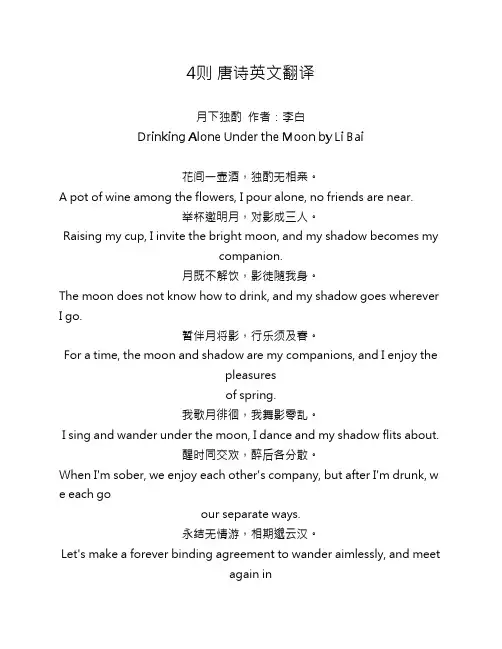
4则唐诗英文翻译月下独酌作者:李白Drinking Alone Under the Moon by Li Bai花间一壶酒,独酌无相亲。
A pot of wine among the flowers, I pour alone, no friends are near.举杯邀明月,对影成三人。
Raising my cup, I invite the bright moon, and my shadow becomes mycompanion.月既不解饮,影徒随我身。
The moon does not know how to drink, and my shadow goes wherever I go.暂伴月将影,行乐须及春。
For a time, the moon and shadow are my companions, and I enjoy thepleasuresof spring.我歌月徘徊,我舞影零乱。
I sing and wander under the moon, I dance and my shadow flits about.醒时同交欢,醉后各分散。
When I'm sober, we enjoy each other's company, but after I'm drunk, w e each goour separate ways.永结无情游,相期邈云汉。
Let's make a forever binding agreement to wander aimlessly, and meetagain inthe clouds of the distant sky.望岳作者:杜甫Gazing at the Mountain by Du Fu岱宗夫如何,齐鲁青未了。
How is it on Tai Mountain, the green of Qi and Lu has yet to fade.造化钟神秀,阴阳割昏晓。

古诗英文翻译在日常生活或是工作学习中,大家对古诗都再熟悉不过了吧,古诗准确地来说应该叫格律诗,包括律诗和绝句。
那么问题来了,到底什么样的'古诗才经典呢?下面是小编整理的古诗英文翻译,欢迎大家借鉴与参考,希望对大家有所帮助。
古诗英文翻译篇1王维九月九日忆山东兄弟Thinking Of My Brothers On Mountain-climbing Day.独在异乡为异客All alone in a foreign land,每逢佳节倍思亲I am twice as homesick on this day遥知兄弟登高处When brothers carry dogwood up the mountain,遍插茱萸少一人Each of them a branch but my branch missing.李白关山月The Moon At The Fortified Pass明月出天山The bright moon lifts from the Mountain of Heaven苍茫云海间In an infinite haze of cloud and sea,长风几万里And the wind, that has come a thousand miles, 吹度玉门关Beats at the Jade Pass battlements....汉下白登道China marches its men down Baideng Road胡窥青海湾While T artar troops peer across blue waters of the bay....由来征战地And since not one battle famous in history不见有人还Sent all its fighters back again,戍客望边色The soldiers turn round, looking toward the border,思归多苦颜And think of home, with wistful eyes,高楼当此夜And of those tonight in the upper chambers叹息未应闲Who toss and sigh and cannot rest.李白子夜四时歌春歌Ballads Of Four Seasons: Spring秦地罗敷女The lovely LuoFu of the western land采桑绿水边Plucks mulberry leaves by the green waterside.素手青条上Across the green boughs stretches out her white hand;红妆白日鲜In golden sunshine her rosy robe is dyed.蚕饥妾欲去"my silkworms are hungry, I cannot stay.五马莫留连Tarry not with your five-horse cab, I pray."张继枫桥夜泊A Night-Mooring Near Maple Bridge月落乌啼霜满天Moon going down, Crow cawing, frost filling all over the sky,江枫渔火对愁眠Maple-trees near the river and torch in the fisher opposite the sleeping anxiety.姑苏城外寒山寺From the temple on Cold Mountain out of Suzhou,夜半钟声到客船The midnight ding touches my boat.王翰凉州词A Song of LiangZhou葡萄美酒夜光杯Enjoying beautiful grape wine of moonlight cups,欲饮琵琶马上催Want to drink lute but hurried on the horseback.醉卧沙场君莫笑Don't laugh when fall asleep drunk on the battlefield古来征战几人回How many soldiers ever come back home?岑参逢入京使On Meeting A Messenger to The Capital故园东望路漫漫It's a long way home, a long way east.双袖龙钟泪不干I am old and my sleeve is wet with tears.马上相逢无纸笔Meeting on horseback,no means of writing.凭君传语报平安T ell them three words: "He is safe."古诗英文翻译篇2杜牧《清明》清明时节雨纷纷,路上行人欲断魂。
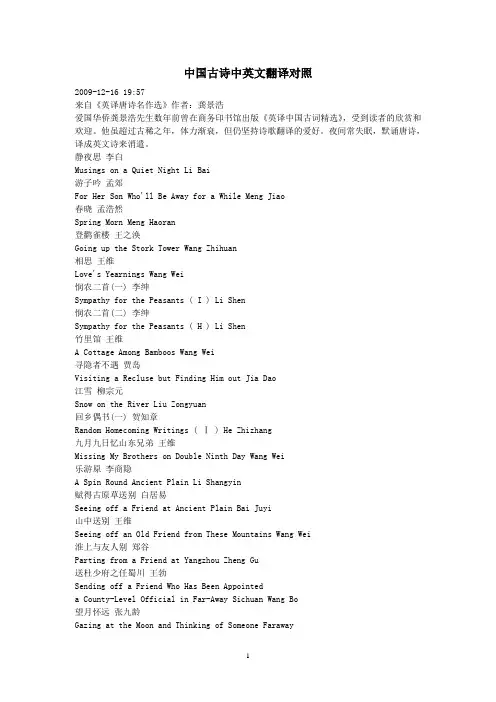
中国古诗中英文翻译对照2009-12-16 19:57来自《英译唐诗名作选》作者:龚景浩爱国华侨龚景浩先生数年前曾在商务印书馆出版《英译中国古词精选》,受到读者的欣赏和欢迎。
他虽超过古稀之年,体力渐衰,但仍坚持诗歌翻译的爱好。
夜间常失眠,默诵唐诗,译成英文诗来消遣。
静夜思李白Musings on a Quiet Night Li Bai游子吟孟郊For Her Son Who'll Be Away for a While Meng Jiao春晓孟浩然Spring Morn Meng Haoran登鹳雀楼王之涣Going up the Stork Tower Wang Zhihuan相思王维Love's Yearnings Wang Wei悯农二首(一) 李绅Sympathy for the Peasants ( I ) Li Shen悯农二首(二) 李绅Sympathy for the Peasants ( H ) Li Shen竹里馆王维A Cottage Among Bamboos Wang Wei寻隐者不遇贾岛Visiting a Recluse but Finding Him out Jia Dao江雪柳宗元Snow on the River Liu Zongyuan回乡偶书(一) 贺知章Random Homecoming Writings ( Ⅰ ) He Zhizhang九月九日忆山东兄弟王维Missing My Brothers on Double Ninth Day Wang Wei乐游原李商隐A Spin Round Ancient Plain Li Shangyin赋得古原草送别白居易Seeing off a Friend at Ancient Plain Bai Juyi山中送别王维Seeing off an Old Friend from These Mountains Wang Wei淮上与友人别郑谷Parting from a Friend at Yangzhou Zheng Gu送杜少府之任蜀川王勃Sending off a Friend Who Has Been Appointeda County-Level Official in Far-Away Sichuan Wang Bo望月怀远张九龄Gazing at the Moon and Thinking of Someone FarawayZhang J iuling白石滩王维White Stone Beach Wang Wei鸟鸣涧王维Birds Chirping over the Hill Creek Wang Wei春夜喜雨杜甫Propitious Rain Falling at Midnight Du Fu宿建德江孟浩然Staying Overnight on Jiande River Meng Haoran滁州西涧韦应物Chuzhou's West Brook Wei Yingwu题破山寺后禅院常建Meditation Rooms at the Back of the Cleft-BoulderHill Temple Chang Jian绝句杜甫A Heptasyllabic Quatrain Du Fu阙题刘脊虚A Poem Lacking a Title Liu Shenxu送元二使安西王维Sending off a Friend, Who Has Been Appointed Envoy to the West Lands Wang Wei凉州词王之涣Liangzhou Song Wang Zhihuan凉州词王翰Liangzhou Song Wang Hah夜宿山寺李白Staying Overnight in a Mountain Temple Li Bai杂诗(其二) 王维Miscellaneous Poems (Second in a Series) Wang Wei问刘十九自居易Asking a Friend Bai Juyi风李峤Wind Li Qiao马诗李贺A Horse Poem Li He秋浦歌李白Autumn Waterside Songs Li Bai剑客贾岛Jianke Jia Dao于易水送人骆宾王Sending off a Warrior By the Yishui River LuG Binwang 春怨金昌绪Complaint Against Spring lin Changxu竹枝词刘禹锡The Bamboo Song Liu Yuxi城东早春杨巨源Early Spring in East City Yang Juyuan晚春韩愈Late Spring Han Yu山亭夏日高骈A Summer's Day in a Hill Garden Gao Pian秋日耿讳An Autumn Day Geng Wei白雪歌送武判官归京岑参Snow (For Chief of Secretarial Staff Wu,Who Was B&ng Called Back to the Capital) Cen Shen过故人庄孟浩然Visiting an Old Friend's Country Place Meng Haoran江村即事司空曙Scene from a Riverside Village Sikong Shu社日王驾Community Day Wang Jia送人游吴杜荀鹤Seeing off a Friend, Who Was Going to Tour Suzhou Du Xunhe 枫桥夜泊张继Night Boat Call at Maple Bridge, Suzhou Zhang Ji早发白帝城李白Sailing Early from Baidi Town Li Bai黄鹤楼送孟浩然之广陵李白Seeing off Fellow Poet Meng Haoran, Who WasLeaving the Yellow Crane Tower for Yangzhou Li Bai黄鹤楼崔颢The Yellow Crane Tower Cui Hao夜雨寄北李商隐A Letter Sent North about These Nightly Rainsin Bashan Mountains Li Shangyin无题李商隐Poem Without a Title Li Shangyin登幽州台歌陈子昂Ascending Youzhou Terrace Chen Zi'ang与诸子登岘首孟浩然Climbing Mount Xianshou with Scholarly Friends Meng Haoran 滕王阁王勃Prince of Teng's Pavilion-House Wang Bo洛阳道储光羲The Luoyang Highway Chu Guangxi遣悲怀元稹Venting My Sorrow Yuan Zhen赠卖松人于武陵To a Tree Vendor Yu Wuling乌衣巷刘禹锡Black Robe Lane Liu Yuxi清明杜牧The Day of Clear and Bright Du Mu江南春杜牧Spring Comes to Jiangnan Du Mu泊秦淮杜牧Overnight Stay on Qinhuai River, Nanjing Du Mu山行杜牧Driving by the Mountain Du Mu金缕衣杜秋娘Garment Stitched with Gold Threads Du Qiuniang自遣罗隐Self Consolation Luo Yin题都城南庄崔护South Side of the Capital City Cui Hu月下独酌李白Drinking Alone Underneath a Moon Li Bai将进酒李白Drink Your Fill! Li Bai春日忆李白杜甫Remembering Li Bai on a Spring Day Du Fu春望杜甫Spring Outlook Du Fu前出塞杜甫Song of the Fortified Town (One from a First Group of"Fortified Town" Poems) Du Fu石壕吏杜甫A Village Official Du Fu陪诸贵公子丈八沟携妓纳凉晚际遇雨杜甫A Cruise on Long-Ditch Creek in the Company of Some Young Gentlemen and Their "Hired" Ladies, and Got Caught in a Shower Along the Twilight Hour Du Fu与朱山人杜甫To Zhu—the Mountain Person Du Fu赠卫八处士杜甫To a Younger Friend, Who Is a Retiring Sort of Person Du Fu李白篇送友人青山横北郭白水绕东城此地一为别孤蓬万里征浮云游子意落日故人情挥手自兹去萧萧班马鸣Farewell To A FriendGreen mountains bar the northern sky;White water girds the eastern town.Here is the place to say good-bye;You'll drift like lonely thisledown.With floating cloud you'll float away;Like parting day I'll part from you.We wave as you start on your way;Our steeds still neigh, "Adieu, adieu!"登金陵凤凰台凤凰台上凤凰游凤去台空江自流吴宫花草埋幽径晋代衣冠成古丘三山半落青天外二水中分白鹭洲总为浮云能蔽日长安不见使人愁On Phoenix Terrace At JinlingOn Phoenix Terrace once phoenixes came to sing;The birds are gone, but still roll on the river's waves. The ruined palace's buried 'neath the weeds in spring; The ancient sages in caps and gowns all lie in graves. The three-peak'd mountain is half lost in azure sky; The two-fork'd stream by Egret Isle is kept apart.As floating clouds can veil the bright sun from the eye, Imperial Court, now out of sight, saddens my heart.宣州谢眺楼饯别校书叔云弃我去者昨日之日不可留乱我心者今日之日多烦忧长风万里送秋雁对此可以酣高楼蓬莱文章建安骨中间小谢又清发俱怀逸兴壮思飞欲上青天览明月抽刀断水水更流举杯销愁愁更愁人生在世不称意明朝散发弄扁舟Farewell To Uncle Yun, The Imperial Librarian, At The Xie Tiao Pavilion In XuanzhouWhat left me yesterdayCan be retained no more;What worries me todayAre the times for which I feel sore.In autumn wind for miles and miles the wild geese fly.Let's follow them with eyes and drink in tower high.Your writing's forcible, like ancient poets, whileMine is in Junior Xie's direct and easy style.Both of us have ambitions high;We'd bring the moon down from the sky.Cut running water with a sword, it will faster flow;Drink wine to drown your sorrow, it will heavier grow.If we despair in our lifetime of all affairs,Tomorrow let us sail away with loosened hairs.赠汪伦李白乘舟将欲行忽闻岸上踏歌声桃花潭水深千尺不及汪伦送我情To Wang LunI, Li Bai, sit aboard a ship about to goWhen suddenly on shore your farewell songs o'erflow. However deep the Lake of Peach Blossom may be,It's not so deep, O Wang Lun! as your love for me.早发白帝城朝辞白帝彩云间千里江陵一日还两岸猿声啼不住轻舟已过万重山Leaving White Emperor Town At DawnLeaving at dawn the White Emperor crowned with cloud, I've sailed a thousand li through canyons in a day. With monkeys' sad adieus the riverbanks are loud;My skiff has left ten thousand mountains far away.月下独酌花间一壶酒独酌无相亲举杯邀明月对影成三人月既不解饮影徒随我身暂伴月将影行乐须及春我歌月徘徊我舞影零乱醒时同交欢醉后各分散永结无情游相期邈云汉Drinking Alone Under The MoonAmong the flowers from a pot of wineI drink alone beneath the bright moonshine.I raise my cup to invite the moon, who blendsHer light with my shadow and we're three friends. The moon does not know how to drink her share;In vain my shadow follows me here and there. Together with them for the time I stayAnd make merry before spring's spend away.I sing the moon to linger with my song;My shadow disperses as I dance along.Sober, we three remain cheerful and gay; Drunken, we part and each goes his way.Our friendship will outshine all earthly love; Next time we'll meet beyond the stars above.杜甫篇望岳岱宗夫如何齐鲁青未了造化钟神秀阴阳割昏晓荡胸生层云决眦入归鸟会当凌绝顶一览众山小Gazing At Mount TaiO, peak of peaks, how high it stands!One boundless green o'erspreads two states.A marvel done by nature's hands,O'er light ang shade it dominates.Clouds rise therefrom and lave my breast;I strain my eyes and see birds fleet.I must ascend the mountain's crest;It dwarfs all peaks under my feet.赠李白秋来相顾尚飘蓬未就丹砂愧葛洪痛饮狂歌空度日飞扬跋扈为谁雄To Li BaiWhen autumn comes, you're drifting still like thistledown. You try to find the way to heaven, but you fail.In singing mad and drinking dead your days you drown.For whom will fly the roc? For whom will leap the whale?兵车行车辚辚马萧萧行人弓箭各在腰耶娘妻子走相送尘埃不见咸阳桥牵衣顿足拦道哭哭声直上干云霄道旁过者问行人行人但云点行频或从十五北防河便至四十西营田去时里正与裹头归来头白还戍边边廷流血成海水武皇开边意未已君不闻汉家山东二百州千村万落生荆杞纵有健妇把锄犁禾生陇亩无东西况复秦兵耐苦战被驱不异犬与鸡长者虽有问役夫敢伸恨且如今年冬未休关西卒县官急索租租税从何出信知生男恶反是生女好生女犹得嫁比邻生男埋没随百草君不见青海头古来白骨无人收新鬼烦冤旧鬼哭天阴雨湿声啾啾Song Of The ConscriptsChariots rumbleand horses grumble.The conscripts march with bow and arrows at the waist.Their fathers, mothers, wives and children come in hasteTo see them off; the bridge is shrouded in dust they've raised.They clutch at the men's coats and stamp and bar the way;Their grief cries loud and strikes the cloud straight, straightaway. Another onlooker by roadside asks an enrollee,"The conscription is frequent," only answers he."Some went north at fifteen to guard the rivershoreAnd were sent west to till the land at forty-four.The elder bound their young heads when they went away;Just home, they're sent to the frontier though their hair's grey. The field on borderland becomes a sea of blood;The emperor's greed for land is still at high blood.Have you not heard two hundred districts east of the Hua Mountain lie Where briers and brambles grow in villages far and night?Although stout women can wield the plough and the hoe,They know not east from west where thorns and weeds o'ergrow.The enemy are used to hard and stubborn fight:Our men are driven just like dogs or fowls in flight.You are kind to ask me.To complain I'm not free.In winter of this yearConscription goes on here.The magistrates for taxes press;How can we pay them in distress!If we had known sons bring no joy,We'd have preferred girl to boy.A daughter can be married to a neighbour, alas!A son can only be buried under the grass!Have you not seenOn borders greenBleached bones since olden days unburied on the plain?The old ghosts weep and cry, while the new ghosts complain;The air is loud with screech and scream in gloomy rain."将进酒 ----李白君不见,黄河之水天上来,奔流到海不复回?君不见,高堂明镜悲白发,朝如青丝暮成雪?人生得意须尽欢,莫使金樽空对月,天生我材必有用,千金散尽还复来。
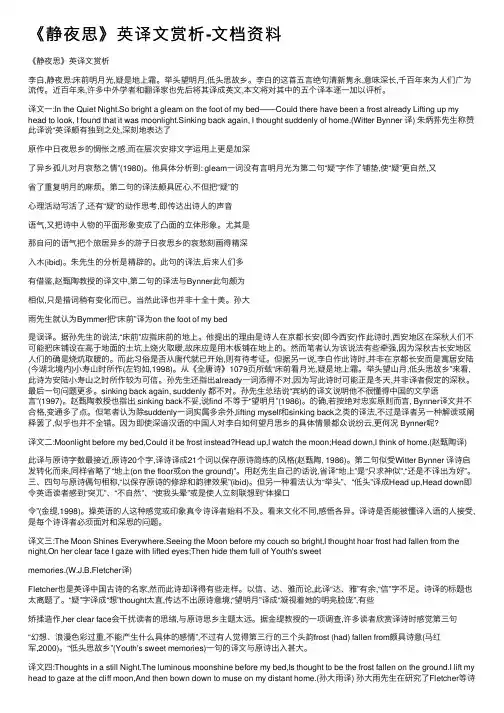
《静夜思》英译⽂赏析-⽂档资料《静夜思》英译⽂赏析李⽩,静夜思:床前明⽉光,疑是地上霜。
举头望明⽉,低头思故乡。
李⽩的这⾸五⾔绝句清新隽永,意味深长,千百年来为⼈们⼴为流传。
近百年来,许多中外学者和翻译家也先后将其译成英⽂,本⽂将对其中的五个译本逐⼀加以评析。
译⽂⼀:In the Quiet Night.So bright a gleam on the foot of my bed――Could there have been a frost already Lifting up my head to look, I found that it was moonlight.Sinking back again, I thought suddenly of home.(Witter Bynner 译) 朱炳荪先⽣称赞此译说“英译颇有独到之处,深刻地表达了原作中⽇夜思乡的惆怅之感,⽽在层次安排⽂字运⽤上更是加深了异乡孤⼉对⽉哀愁之情”(1980)。
他具体分析到: gleam⼀词没有⾔明⽉光为第⼆句“疑”字作了铺垫,使“疑”更⾃然,⼜省了重复明⽉的⿇烦。
第⼆句的译法颇具匠⼼,不但把“疑”的⼼理活动写活了,还有“疑”的动作思考,即传达出诗⼈的声⾳语⽓,⼜把诗中⼈物的平⾯形象变成了凸⾯的⽴体形象。
尤其是那⾃问的语⽓把个旅居异乡的游⼦⽇夜思乡的哀愁刻画得精深⼊⽊(ibid)。
朱先⽣的分析是精辟的。
此句的译法,后来⼈们多有借鉴,赵甄陶教授的译⽂中,第⼆句的译法与Bynner此句颇为相似,只是措词稍有变化⽽已。
当然此译也并⾮⼗全⼗美。
孙⼤⾬先⽣就认为Bymmer把“床前”译为on the foot of my bed是误译。
据孙先⽣的说法,“床前”应指床前的地上。
他提出的理由是诗⼈在京都长安(即今西安)作此诗时,西安地区在深秋⼈们不可能把床铺设在⾼于地⾯的⼟坑上烧⽕取暖,故床应是⽤⽊板铺在地上的。
然⽽笔者认为该说法有些牵强,因为深秋古长安地区⼈们的确是烧炕取暖的。
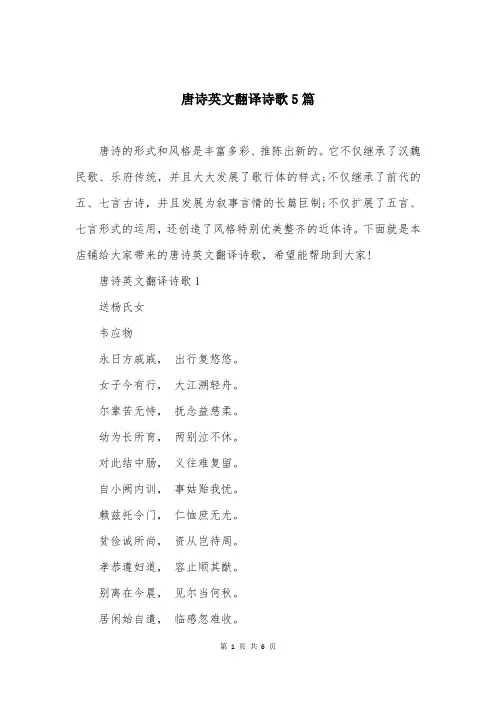
唐诗英文翻译诗歌5篇唐诗的形式和风格是丰富多彩、推陈出新的。
它不仅继承了汉魏民歌、乐府传统,并且大大发展了歌行体的样式;不仅继承了前代的五、七言古诗,并且发展为叙事言情的长篇巨制;不仅扩展了五言、七言形式的运用,还创造了风格特别优美整齐的近体诗。
下面就是本店铺给大家带来的唐诗英文翻译诗歌,希望能帮助到大家!唐诗英文翻译诗歌1送杨氏女韦应物永日方戚戚,出行复悠悠。
女子今有行,大江溯轻舟。
尔辈苦无恃,抚念益慈柔。
幼为长所育,两别泣不休。
对此结中肠,义往难复留。
自小阙内训,事姑贻我忧。
赖兹托令门,仁恤庶无尤。
贫俭诚所尚,资从岂待周。
孝恭遵妇道,容止顺其猷。
别离在今晨,见尔当何秋。
居闲始自遣,临感忽难收。
归来视幼女,零泪缘缨流。
to my daughter on her marriage into the yang family wei yingwumy heart has been heavy all day longbecause you have so far to go.the marriage of a girl, away from her parents,is the launching of a little boat on a great river. …you were very young when your mother died,which made me the more tender of you.your elder sister has looked out for you,and now you are both crying and cannot part.this makes my grief the harder to bear;yet it is right that you should go.…having had from childhood no mother to guide you, how will you honour your mother-in-law?it's an excellent family; they will be kind to you, they will forgive you your mistakes --although ours has been so pure and poorthat you can take them no great dowry.be gentle and respectful, as a woman should be, careful of word and look, observant of good example. …after this morning we separate,there's no knowing for how long….i always try to hide my feelings --they are suddenly too much for me,when i turn and see my younger daughterwith the tears running down her cheek.唐诗英文翻译诗歌2郡斋雨中与诸文士燕集韦应物兵卫森画戟,宴寝凝清香。
唐诗宋词英语翻译大全中国诗歌在八十多年的流程里,几经波折,形容百般,诗歌流派和群落明明灭灭,新、旧两体明分暗渡,构成20世纪中国诗歌灿烂的星空。
下面是店铺带来的唐诗宋词英语翻译,欢迎阅读!唐诗宋词英语翻译篇一王维渭川田家斜光照墟落,穷巷牛羊归。
野老念牧童,倚杖候荆扉。
雉雊麦苗秀,蚕眠桑叶稀。
田夫荷锄立,相见语依依。
即此羡闲逸,怅然吟式微。
Five-character-quatrainWang WeiA FARM-HOUSE ON THE WEI RIVERIn the slant of the sun on the country-side,Cattle and sheep trail home along the lane;And a rugged old man in a thatch doorLeans on a staff and thinks of his son, the herdboy.There are whirring pheasants? full wheat-ears,Silk-worms asleep, pared mulberry-leaves.And the farmers, returning with hoes on their shoulders,Hail one another familiarly....No wonder I long for the simple lifeAnd am sighing the old song, Oh, to go Back Again!唐诗宋词英语翻译篇二王维西施咏艳色天下重,西施宁久微?朝为越溪女,暮作吴宫妃。
贱日岂殊众? 贵来方悟稀。
邀人傅脂粉,不自著罗衣,君宠益娇态,君怜无是非。
当时浣纱伴,莫得同车归。
持谢邻家子,效颦安可希?Five-character-quatrainWang WeiTHE BEAUTIFUL XI SHISince beauty is honoured all over the Empire,How could Xi Shi remain humbly at home? --Washing clothes at dawn by a southern lake --And that evening a great lady in a palace of the north:Lowly one day, no different from the others,The next day exalted, everyone praising her.No more would her own hands powder her faceOr arrange on her shoulders a silken robe.And the more the King loved her, the lovelier she looked, Blinding him away from wisdom....Girls who had once washed silk beside herWere kept at a distance from her chariot.And none of the girls in her neighbours\' housesBy pursing their brows could copy her beauty.唐诗宋词英语翻译篇三孟浩然秋登兰山寄张五北山白云里,隐者自怡悦;相望始登高,心随雁飞灭。
许渊冲唐诗宋词英语翻译英⽂版 唐诗是中国古典诗歌的艺术⾼峰。
从⼀般研究成果来看,学者们都偏向于研究唐诗是触景⽣情、抒发胸臆的⽂学作品。
下⾯是店铺带来的许渊冲唐诗宋词英语翻译,欢迎阅读! 许渊冲唐诗宋词英语翻译篇⼀ 孟郊 烈⼥操 梧桐相待⽼,鸳鸯会双死; 贞妇贵殉夫,舍⽣亦如此。
波澜誓不起,妾⼼井中⽔。
Folk-song-styled-verse Meng Jiao A SONG OF A PURE-HEARTED GIRL Lakka-trees ripen two by two And mandarin-ducks die side by side. If a true-hearted girl will love only her husband, In a life as faithfully lived as theirs, What troubling wave can arrive to vex A spirit like water in a timeless well? 许渊冲唐诗宋词英语翻译篇⼆ 孟郊 游⼦吟 慈母⼿中线,游⼦⾝上⾐; 临⾏密密缝,意恐迟迟归。
谁⾔⼨草⼼,报得三春辉? Folk-song-styled-verse Meng Jiao A TRAVELLER\'S SONG The thread in the hands of a fond-hearted mother Makes clothes for the body of her wayward boy; Carefully she sews and thoroughly she mends, Dreading the delays that will keep him late from home. But how much love has the inch-long grass For three spring months of the light of the sun? 许渊冲唐诗宋词英语翻译篇三 七⾔古诗 陈⼦昂 登幽州台歌 前不见古⼈,后不见来者; 念天地之悠悠,独怆然⽽涕下。
唐诗宋词英译本以下是唐诗宋词的英译本:1. 《相思》愿君多采撷,此物最相思。
Gather them till full is your hand;They would revive fond memories.2. 《游子吟》临行密密缝,意恐迟迟归。
Sewn stitch by stitch before he leavesFor fear his return be delayed.3. 《春夜喜雨》随风潜入夜,润物细无声。
With wind it steals in night;Mute, it moistens each thing.4. 《声声慢》寻寻觅觅,冷冷清清,凄凄惨惨戚戚。
Searching here and there, feeling cold and desolate, in wretched and pitiable condition.5. 《登高》无边落木萧萧下,不尽长江滚滚来。
The boundless forest of falling leaves rustle down, the endless Yangtze River rolls on and on.6. 《鹊桥仙》两情若是久长时,又岂在朝朝暮暮!If the love between two people lasts a long time, why does it matter if they are together every day!7. 《牡丹亭》情不知所起,一往而深。
I don't know where love comes from, but it runs deep.8. 《浪淘沙令·帘外雨潺潺》流水落花春去也,天上人间。
The spring has passed with flowers and water going down the stream, from heaven to earth.9. 《江雪》千山鸟飞绝,万径人踪灭。
九月九日忆山东兄弟古诗英文翻译《九月九日忆山东兄弟》是王维的诗作。
王维这首《九月九日忆山东兄弟》诗载于《全唐诗》卷一百二十八。
九月九日忆山东兄弟[唐]王维独在异乡为异客,每逢佳节倍思亲。
遥知兄弟登高处,遍插茱萸少一人。
浅析六版本《九月九日忆山东兄弟》英译译文一(王宝童,上海世图2005版《王维百首(汉英对照图文本)》):On Double Ninth Day Thinking of My Brothers at HomeA lonely stranger in a strange land I’m cast,Sore sick for my dears on every festive day.By now my brothers must some heights have passed,But a cornel wearer missing’ll damp the day.第二行的sore sick是英文中不存在的表达,就像汉语没有“酸病”一样。
根据Cambridge Advanced Learners’ Dictionary & Thesaurus, dear的名词含义有两个: [C usually singular] informal a kind person和[as form of address] used to address someone you love or are being friendly to, not used between men。
如此看来,译文这样用dears是不对的。
第三行的pass意为“经过”,不一定是“登高”。
最后一句的missing指人时是“失踪”的意思,用在这里显然不合适。
damp the play既非英文固定表达,又不易从字面推断想要表达的意思(把戏剧弄湿了?)。
和前面的sore sick一样,这也属于译者捏造英文表达,对于英语母语者来说这样的“创造”只会让他们读的一头雾水。
成员:孙松谭科景汉卿朱琳静暮从碧山下,山月随人归。
Down the blue mountain in the evening,Moonlight was my homeward escort.下终南山过斛斯山人宿置酒李白举杯邀明月,对影成三人。
Till, raising my cup, I asked the bright moonTo bring me my shadow and make us three.月下独酌李白会当凌绝顶,一览众山小。
When shall I reach the top and holdAll mountains in a single glance?望岳杜甫在山泉水清,出山泉水浊The brook was pure in its mountain source,But away from the mountain its waters darken.佳人杜甫水深波浪阔,无使蛟龙得。
There were waters to cross, they were wild and tossing;If you fell, there were dragons and rivermonsters.梦李白(之一)杜甫五陵北原上,万古青蒙蒙。
And northward there lie, in five graveyards,Calm forever under dewy green grass,与高适薛据登慈恩寺浮图岑参明月出天山,苍茫云海间The bright moon lifts from the Mountain of HeavenIn an infinite haze of cloud and sea,关山月李白长风几万里,吹度玉门关。
And the wind, that has come a thousand miles,Beats at the Jade Pass battlements....关山月李白忽如一夜春风来,千树万树梨花开。
高玉昆:唐诗英译唐诗英译工作在当今世界日益频繁的中西方文化交流中占有重要地位,为传播辉煌的唐诗艺术、促进世界诗歌创作发展,起到了积极作用。
本文回顾历史,面对现实,考察了近百年的唐诗英译历程,结合翻译理论的发展,归纳分析了唐诗英译实践和理论建设中的不同方向及其探索。
一种是重视声韵,用传统英语诗律翻译唐诗,以求再现唐诗的整体美;一种则注重意象,用自由的散体译诗,以求传达唐诗艺术的真质。
在主张以自由体译诗的学者、译家中,也各自有不同的努力,或简省、或详尽;或照顾到韵脚,或全抛开押韵和诗行,他们都有各自的成功与不足。
本文认为,应在今后的唐诗英译工作中,把这两种方向结合起来,努力解决翻译中形式与内容、韵律与达意的矛盾,达到一种“化境”。
这样的理论与实践的探索,将有益于世界文学的发展及中西方文化交流。
一具有辉煌艺术成就的我国唐代诗歌,是世界艺术宝库中的瑰宝,李白和杜甫等伟大诗人的诗篇传遍了各个大陆,受到各民族人民的喜爱,特别是在英语世界,得到了广泛的传播。
据今所知,西方最早大力进行唐诗英译工作的是18世纪英国汉学家、诗人詹尼斯(S.Jenyns),其遗作经后人整理,编成《唐诗三百首选读》及《续集》(Selections from the 300 Poems of the Tang Dynasty, A further Selections from the 300 Poems of the Tang Dynasty),于20世纪40年代在伦敦出版。
最早英译唐代诗人专集的是小薰良(S.Obata),其《李白诗集》(The Works of Li Po, the Chinese Poet),于1922年在纽约出版。
最早英译唐诗选本的是宾纳(W.Bynner)和江亢虎合译的《群玉山头:唐诗三百首》(The Jade Mountain,a Chinese Anthology BeingThree Handred Poems of the Tang Dynasty),为蘅塘退士所编《唐诗三百首》的全译本,1929年在纽约出版。
自上世纪末以来,其他著名的唐诗英译家有戴维斯爵士(Sir J.F.Davis)、翟理斯(H.A.Giles)、庞德(E.Pound)、克兰默一宾(L.CranmerByng)、韦利(A.Waley)、洛维尔(A·Lowell)、弗莱彻(W.J.Fletcher)、洪业(煨莲,William Hung)、柳无忌、欧文(S.Owen)等等,他们做了大量的唐诗英译工作。
唐诗的英译工作不仅把唐诗艺术介绍给英语世界,使西方读者得到美感享受,而且还对英语世界的新诗创作产生了巨大影响,如现代派诗人庞德、艾略特(T.S.Eliot)就深受唐诗艺术的影响,从中寻找欧美新诗运动的推动力,为世人所共知。
美国批评家卡茨(M.Katz)就注意到意象派女诗人洛维尔的诗《凌晨两点:一条伦敦大街》(A London Thoroughfare:2 a.m.)与杜甫《月夜》的关系,这两首诗都是描写了在闺房中倚窗望月的妇女形象。
美国当代诗人雷克斯洛斯(K.Rexroth,中文名字叫王红公)曾说:“我认为中国诗对我的影响,远远大过其他的诗。
我自己写诗时,也大多遵循一种中国式的法则(a kind of Chinese rule)”。
他曾大量翻译唐诗并予以发表。
1969年美国出版了一本当代诗选《赤裸的诗:近年美国开放体的诗歌》(Naked Poetry:Recent American Poetry in Open Forms),选录16首他的诗作,其中14首其实是杜甫等人诗的英译,由于他年辈较早,所以他的诗作列于书首,诗评家们诙谐地感叹道,美国当代诗歌的发展序幕原来竟是由中国唐诗开启的。
当代诗人勃来(R.Bly)也承认他自己以及他朋友们的确受到白居易、李贺等唐代诗人的影响。
在我国改革开放形势下的今天,面对世界东西方日益增强的文化交流,我国的唐诗英译工作正处于一个新的繁荣时期。
80年代以来,国内已大量出版发行由我国学者、译家翻译的唐诗译本,如杨宪益的《唐宋诗文选译》(与格雷蒂斯Gladys合译)、徐忠杰的《唐诗二百首新译》、王守义的《唐宋诗词英译》(与诺弗尔J.Neville合译),吴钧陶的《杜甫诗英译》、许渊冲的《唐诗三百首新译》、《李白诗选译》、《唐诗一百五十首英译》、张廷琛的《唐诗一百首英译》(与魏博思Bruce M. Wilson合译),以及翁显良的《古译英译》等。
众所周知,把不同民族的文学、特别是诗歌,从语言形式到思想感情进行翻译,是一件难度极大的工作,因而西方流传一句意大利谚语:“翻译者即叛逆者”(Traduttore traditore)。
许多诗人、理论家们也持有“诗不可译”观点,诗人雪莱(P.B.Shelley)在《诗辩》(Defense of Poetry)中认为,企图把诗人的创作从一种语言搬移到另一种语言,就好比把一朵紫罗兰投入坩埚,来化验出它的颜色和香味的数据,“因此,译诗是徒劳无功的”。
弗罗斯特(R.Frost)也认为诗一经翻译就会失去它自身的特质(Poetry is what gets lost in translation)。
语言学家雅各布森(R.Jakobson)断定诗严格说来是不能翻译的。
话虽然说得令人沮丧,但自詹尼斯以来的优秀译家的唐诗英译实践证明,诗是可以趋近准确而传神地译成另一种语言形式,在另一国度传诵。
唐诗英译工作还将继续在东西方文化交流中发挥其重要作用。
歌德(J.W.Goethe)在1827年7月写给苏格兰作家卡莱尔(T.Carlyle)的信中说:“无论说翻译有什么不足之处,它仍然不失为世界上各项事务中最重要、最有价值的一项工作。
”我们今天更应该重视唐诗英译工作,弘扬祖国古代灿烂文化,以利于世界文学的发展。
对于文学作品的翻译,应当走什么样的途径?用什么方法最合适?从公元前古罗马的西塞罗(M. T. Cicero)、贺拉斯(Horace),到本世纪初意大利的克罗齐(B. Croce)、德国的本亚明(W.Benjamin),人们从理论上进行了广泛而深入的探讨。
英国翻译理论家诺克斯(R. Knox)曾把历史上的翻译理论归纳为两个问题:是文学翻译还是逐字翻译?译者是否有权选择任何文体与词语来表达原文的意思[8]?这是很恰切的。
奥地利哲学家维特根斯坦(L.Wittgenstein)指出:“从一种语言翻译成另一种语言是一项数学任务,把一首抒情诗翻译成外语好比解一道数学题,……这个问题是可以解决的,但并无系统的解决办法”。
唐诗英译的实践及理论探索正是如此,它们一直在提出问题:是忠实地体现唐诗原文的形式、韵律,还是重视传达唐诗原文的思想、精神?是追求精炼、含蓄的传情达意,还是保全原诗的真实与精确?学者、译家们一直在问题的两端之间艰难地走着钢丝,追求着某种完美的“合格翻译”(adequate translation)及“等值效果”(equivalent effect),各持不同的宗旨和方法,弯弯曲曲地走过近百年的唐诗英译进程。
回顾历史,面对现状,考察这些翻译实绩,总结经验,会强有力地促进这项有益的工作健康地发展。
二唐诗的光辉不仅体现在它具有壮丽的诗境、清新的笔墨以及深沉的情感,而且还体现在它富于变化的格律形式、流畅而顿挫的音韵,它充分利用了汉语所能提供的各种手段——节奏、平仄、押韵、对仗、用典等。
唐诗翻译家们首先碰到的就是这些形式美,人们意识到了这项工作的艰难。
连法国的唐诗翻译家埃尔韦—圣—德尼候爵(le marquis d'Herveg—Saint—Denys)在1862年出版的法译本《唐代诗选》前言中说:“这项工作是很冒险的,也是艰辛而痛苦的,因为我们发现那些真正的优美之处无法用任何一门欧洲语言传达出来”。
唐诗英译的先行者詹尼斯也感叹道:“诗的美不仅存在于诗人说了些什么,还存在于他怎样地去说。
而且这种具有诗人个性的表达是那样精致,就好比一朵花不能接枝到另一株树上一样。
诗的内容也许可以被再现,但诗的动态肯定要在翻译中失掉,几乎很难做到两全其美。
当把一部辞典放到桌上时,诗的美就会从窗户飞出去”。
但是,翻译家们还是勇敢地接受了这项“冒险”任务。
正如上世纪末法国大作家福楼拜(G.F.Flaubert)的朋友路易·布耶(L.Bouilhet)打算在法译本中重现唐诗形式或找出其对应形式,采用当时很少人使用的七音步形式译唐诗一样(法国学者认为这大概是源于在唐诗中被奉为经典的七言与五言律诗形式),早期的唐诗英译者也试图用英语诗律来再现或对应唐诗的形式美。
但布耶等法国人的尝试是有限的,而英国人却迈出了一大步。
翟理斯在1898年出版的《用英语诗律翻译的中国诗歌》(Chinese Poetry in English Verse)就将唐诗内容注入英语诗律形式中。
如译王昌龄的七言绝句《闺怨》:At The WarSee the young wife whose bosom ne'er has ached with cruel pain!—In gay array she mounts the tower when spring comes round again.Sudden she sees the willow trees their newest green put on,And sighs for her husband far away in search of glory gone.(闺中少妇不知愁,春日凝妆上翠楼;忽见陌头杨柳色,悔教夫婿觅封候。
)押韵用整齐的ABABCDCD形式;单数行用四音步,双数行用三音步,这是英语诗的常用诗格。
但英诗八行诗(Ottawa Rima)一般为五音步,法国体八行诗(Triolet)也是如此,而这首译诗却用三、四音步。
译诗双数行首字不大写,退行写起,可见译者有让读者把这首译诗当成四行诗看待的意思,如果这样,就成为每行七音步,这在当时英诗创作中是罕见的,这种节奏的安排有可能是有意对应唐诗绝句四行七言的形式,译者运用抑扬格,也有可能是对应唐诗形式中的平仄安排。
所以,我们可以把这种情况看做成译者把英诗格律与唐诗格律融合的结果,正如吕叔湘所指出:翟理斯的译诗“多少都受了中文诗体的影响”。
[14]当然,他对这首诗的诗题内涵的翻译不甚准确,并且为了英诗格律的整齐而颠倒一些词语,但总的说来,翟理斯的唐诗英译韵律流畅,至今还有学者建议选入英语教材或作为精读,让中国学生“细品深摹”[15]。
韦利在1918年出版的《中国诗歌170首》(A Handred and SeventyChinese Poems)中,也尝试了一种1916年至1923年间流行的霍普金斯(G.M.Hopkins)称为“跳跃式格律”(Sprung rhythm)的诗格来翻译唐诗,在英语译文中用重音来体现唐诗中的每个汉字发音效果,在重音之间嵌入非重读音节,如译白居易的《病中五绝》其五:IllnessDear friends,there is no cause for so much sympathy.I shall certainly manage from time to time to take my wallks abroad.All that matters is an active mind, what is the use of feet?By land one can ride in a carrying-chair; by water,be rowed in aboat.(交亲不要苦相忧,亦拟时时强出游。